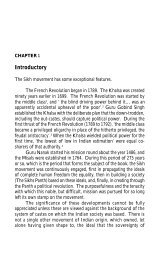Sikh Chairs in North America an Opinion - Global Sikh Studies
Sikh Chairs in North America an Opinion - Global Sikh Studies
Sikh Chairs in North America an Opinion - Global Sikh Studies
Create successful ePaper yourself
Turn your PDF publications into a flip-book with our unique Google optimized e-Paper software.
The first Chair of Punjabi l<strong>an</strong>guage <strong>an</strong>d literature <strong>an</strong>d <strong>Sikh</strong> <strong>Studies</strong> was stated at the<br />
University of British Columbia (UBC) <strong>in</strong> 1987 <strong>an</strong>d Dr Harjot Oberoi was appo<strong>in</strong>ted to<br />
head the program. Dr. Oberoi has s<strong>in</strong>ce published several research articles <strong>an</strong>d a major<br />
book – “Construction of Religious Boundaries” published by Oxford University Press,<br />
New Delhi, <strong>in</strong> 1994. This book has stirred up a storm of controversy <strong>an</strong>d attracted<br />
considerable academic criticism. Even more disturb<strong>in</strong>g is the fact that m<strong>an</strong>y <strong>Sikh</strong><br />
scholars feel that Oberoi has not worked towards fulfill<strong>in</strong>g the agreement signed by the<br />
<strong>Sikh</strong> community <strong>an</strong>d the University when the Chair was founded. Moh<strong>in</strong>der S<strong>in</strong>gh<br />
Gosal, President of the Federation of <strong>Sikh</strong> Societies of C<strong>an</strong>ada, signatory to the contract<br />
between the <strong>Sikh</strong>s <strong>an</strong>d the UBC has charged that the very appo<strong>in</strong>tment of Oberoi was part<br />
of <strong>an</strong> <strong>an</strong>ti-<strong>Sikh</strong> conspiracy. There was a two year delay <strong>in</strong> the appo<strong>in</strong>tment of Oberoi, a<br />
fresh PhD, who was appo<strong>in</strong>ted despite the lack of signific<strong>an</strong>t teach<strong>in</strong>g or research<br />
experience.<br />
A group of <strong>Sikh</strong> scholars from India visited UBC <strong>in</strong> 1994 <strong>an</strong>d met Oberoi. Accord<strong>in</strong>g to<br />
them his publications, as to their content, tone <strong>an</strong>d tenor, were visibly <strong>in</strong>compatible with<br />
objectives of the Chair occupied by him, <strong>an</strong>d grossly unfair to <strong>Sikh</strong> sensibilities 7 .<br />
The second case, that of Pashaura S<strong>in</strong>gh, further exemplifies the problems with <strong>Sikh</strong><br />
<strong>Chairs</strong> as presently constituted.<br />
Dr. Pashaura s<strong>in</strong>gh was awarded a PhD by the University of Toronto <strong>in</strong> 1991 on the basis<br />
of a doctoral thesis entitled “The Text <strong>an</strong>d Me<strong>an</strong><strong>in</strong>g of the Adi Gr<strong>an</strong>th.” Accord<strong>in</strong>g to<br />
m<strong>an</strong>y <strong>Sikh</strong> scholars the thesis was academically unsound, constitut<strong>in</strong>g <strong>an</strong> attack on the<br />
theological <strong>an</strong>d l<strong>in</strong>guistic orig<strong>in</strong>ality of the <strong>Sikh</strong> sacred scriptures. Numerous critical<br />
reviews of the thesis appeared 8 , as did some <strong>in</strong> Pashaura S<strong>in</strong>gh’s defense 9 . this<br />
controversial, <strong>in</strong>experienced scholar was appo<strong>in</strong>ted to head the newly created program at<br />
the University of Michig<strong>an</strong>, even though he later appeared at the Akal Takht to rec<strong>an</strong>t<br />
some of his research.<br />
The extent of bitterness <strong>an</strong>d lack of trust c<strong>an</strong> be further gauged by the fact that two recent<br />
doctoral theses – at the University of Toronto <strong>an</strong>d Columbia University – were sealed at<br />
the request of their authors: they rema<strong>in</strong> unavailable for critical exam<strong>in</strong>ation by other<br />
scholars. Clearly the north <strong>America</strong>n feels frustrated, disappo<strong>in</strong>ted <strong>an</strong>d betrayed.<br />
Though we have cited two examples above, <strong>in</strong> this article our purpose is not to s<strong>in</strong>gle out<br />
<strong>an</strong>y one academic program but to identify <strong>an</strong>d <strong>an</strong>alyze problem areas so that solutions c<strong>an</strong><br />
be explored.<br />
Simply stated, problems surfaced because of a clear discrep<strong>an</strong>cy <strong>in</strong> the expectations of<br />
the <strong>Sikh</strong> community when these “<strong>Chairs</strong>” were established <strong>an</strong>d what the community felt<br />
the universities had delivered. Before one c<strong>an</strong> exam<strong>in</strong>e the gap between expectations <strong>an</strong>d<br />
results, several questions need to be explored. Briefly we will focus on the role of a<br />
University, what to expect from a scholar appo<strong>in</strong>ted to occupy a position at a University,<br />
<strong>an</strong>d what m<strong>an</strong>agement model c<strong>an</strong> satisfy the community, the scholar <strong>an</strong>d the University.
















